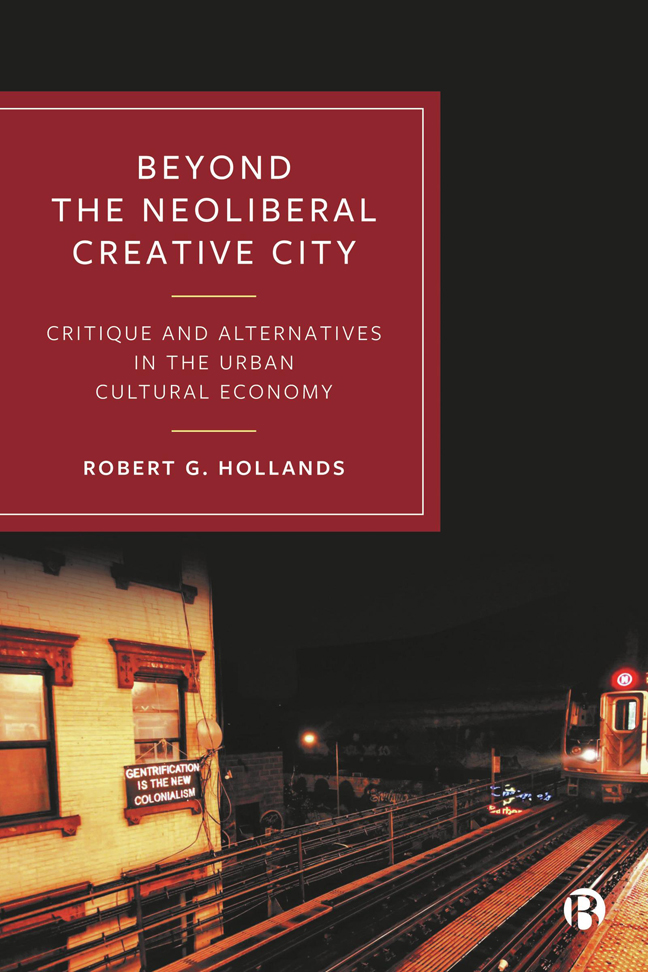Book contents
- Frontmatter
- Dedication
- Contents
- List of Figures, Tables and Case Studies
- About the Author
- Preface
- 1 Neoliberalism, Creativity and Cities
- 2 Urban Entrepreneurialism: The Emergence of the Cultural Economy
- 3 Critiquing the Neoliberal Creative City: But Long Live Alternative Creative Spaces!
- 4 Urban Cultural Movements and Anti-Creative Struggles
- 5 Neoliberal Nightlife and its Alternatives
- 6 Rethinking the Tourist City: Contestation and Alternative Cultural Tourism
- 7 Creative Polarization, Division and Exclusion
- 8 Beyond the Neoliberal Creative City
- Notes
- References
- Index
Preface
Published online by Cambridge University Press: 25 January 2024
- Frontmatter
- Dedication
- Contents
- List of Figures, Tables and Case Studies
- About the Author
- Preface
- 1 Neoliberalism, Creativity and Cities
- 2 Urban Entrepreneurialism: The Emergence of the Cultural Economy
- 3 Critiquing the Neoliberal Creative City: But Long Live Alternative Creative Spaces!
- 4 Urban Cultural Movements and Anti-Creative Struggles
- 5 Neoliberal Nightlife and its Alternatives
- 6 Rethinking the Tourist City: Contestation and Alternative Cultural Tourism
- 7 Creative Polarization, Division and Exclusion
- 8 Beyond the Neoliberal Creative City
- Notes
- References
- Index
Summary
At the core of this book is the idea of struggle. Struggle in the sense of ‘to contend’ or ‘fight to achieve something’, as well as ‘to proceed with some difficulty’. The need to challenge and move beyond the neoliberal creative city requires critique, resistance and the elusive search for alternatives. This involves contesting dominant ideas, using your imagination and struggling for answers.
In the first instance the actual process of finishing this book has been a struggle. Although the bulk of it was written over the last two years, during which time I suffered a heart attack, it has really been ‘in the making’ since I started teaching urban sociology at Newcastle University over 30 years ago. It also represents a long-standing conundrum for me. I believe that a society based on democratic and egalitarian forms of culture and creativity would produce a far better world than the current one based on greed, commodification and inequality. Yet dominant ideas about creative cities and developing the urban cultural economy in contemporary capitalism seem to be as much as part of the problem as the solution. How one squares a vision of an alternative urban future which brings together culture and creativity with concerns of social justice and sustainability is a giant struggle to say the least! This dilemma is at the heart of what this monograph is all about.
The notion of struggle also makes its mark in other senses in this book. For example, it represents a contested debate within the social sciences as to the value of neoliberalism as an explanatory tool of analyses. Some commentators have suggested the term is too diffuse to have much meaning. Others argue that it is mainly an ideological term of derision. Still others contest its explanatory power in understanding the world around us. This book contends that neoliberalism, understood as ‘state-facilitated market rule’ (Peck and Theodore, 2019: 245), and as a class project to reshape the world (Harvey, 2007), is indeed a powerful analytical tool especially when applied to cities today. It also provides a coherent explanation as to why the most ‘successful’ capitalist cities in terms of creativity are also paradoxically the ones characterized by the greatest inequality and social polarization.
Information
- Type
- Chapter
- Information
- Beyond the Neoliberal Creative CityCritique and Alternatives in the Urban Cultural Economy, pp. x - xiiPublisher: Bristol University PressPrint publication year: 2023
